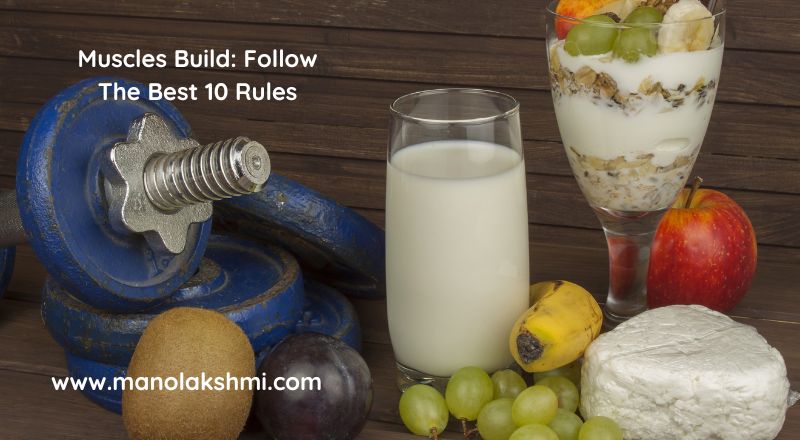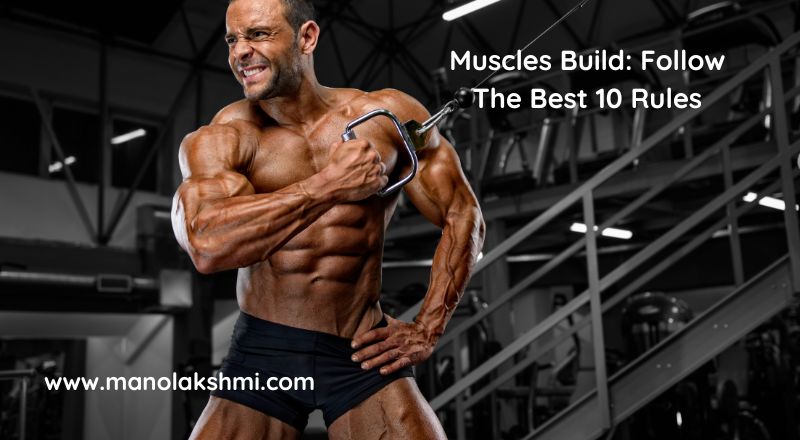What are the Muscles?
Muscles Build-Muscles are technical tissues in the human body that are liable for forging force and action. They are made up of long, thin cells called muscle fibers that are capable of contracting and relaxing in response to electrical signals from the brain and nervous system. Muscles are essential for movement, stability, and posture, and they also play a role in regulating body temperature and maintaining blood glucose levels. Skeletal muscles are attached to the bones and are responsible for voluntary movement, while smooth muscles are found in the internal organs and help regulate involuntary functions like digestion and breathing. Cardiac muscles make up the walls of the heart and are responsible for pumping blood throughout the body.
How do muscles build?
Muscles are built through a process called hypertrophy, which involves the growth and increase in size of individual muscle fibers. The process of hypertrophy occurs when the muscles are subjected to a certain level of stress or resistance, such as through weightlifting or other forms of strength training. When the muscles are placed under this stress, tiny micro-tears occur in the muscle fibers. The body then responds by repairing these tears and building new muscle tissue, resulting in larger and stronger muscles over time. In addition to resistance training, proper nutrition and rest are also key factors in muscle building. Adequate protein intake is necessary to provide the building blocks for muscle growth, while sufficient rest and recovery time allows the muscles to repair and rebuild after a workout.
If you’re looking to build muscles, there are certain rules that you should follow. Here are 10 of the best rules to keep in mind:
Lift with proper form:
Using proper form is essential for building muscles effectively and preventing injury.
To expand on the importance of proper form, here are some additional points to consider:
Proper form ensures that you are targeting the intended muscle group, allowing you to get the most out of your workout.
Incorrect form puts unnecessary strain on joints and muscles, increasing the risk of injury.
Over time, consistently using improper form can lead to chronic pain and long-term damage to your body.
It’s important to start with lighter weights and focus on form before gradually increasing weight. This will assist you construct a robust basis and save you injury.
Don’t be afraid to ask a trainer or experienced gym-goer to check your form and offer tips for improvement. It’s always better to take the time to perfect your form than to risk injury and setbacks.
Focus on compound exercises:
Compound exercises, such as squats and deadlifts, work for multiple muscle groups at once and can help you build muscles faster.
In addition to building muscles faster, compound exercises like squats and deadlifts also have other benefits that can improve your overall fitness journey. Compound exercises are great for burning calories and increasing your metabolism. Because they work multiple muscle groups at once, they require more energy and can help you burn more calories during and after your workout.
These types of exercises can also help improve your balance and coordination. By engaging multiple muscle groups, you are training your body to work together in a more efficient and effective way.
Compound exercises can also help prevent injury by strengthening the muscles and joints used in daily activities. This can be especially beneficial for older adults or those with physically demanding jobs.
Finally, incorporating compound exercises into your workout routine can add variety and challenge. By constantly challenging your muscles with new movements, you can avoid plateaus and continue to see progress over time.
Prioritize progressive overload:
To build muscles, you need to gradually increase the amount of weight you lift over time.

This process of gradually increasing weight is known as progressive overload and is one of the key principles of muscle build. By increasing the weight, you lift, you challenge your muscles to adapt and grow stronger.
Make sure to incorporate compound exercises like squats, deadlifts, and bench presses into your routine as they target multiple muscle groups at once.
Fuel your body with enough protein to support muscle growth. Allow for proper rest and recovery time between workouts to give your muscles time to repair and grow.
Don’t forget about the importance of proper form when lifting weights. Poor form can lead to injuries and stop you from making progress.
Eat enough protein:
Protein is essential for building muscles, so make sure you’re consuming enough of it in your diet.

Protein is made up of amino acids, which are the structural components of muscles.
When you ingest protein, your body converts it into amino acids, which it utilizes to repair and create muscle tissue.
The quantity of protein you require is determined by several factors, including your body weight, degree of activity, and fitness objectives. As a general rule, strive for 0.8 grams of protein per kilogram of body weight every day. If you want to gain muscle, you may need to consume more protein than this.
While protein is essential for muscular growth, it is not the only nutrient you require. Carbohydrates and lipids are also essential for energy production and general wellness.
Make sure you’re eating a well-rounded diet that includes plenty of fruits, vegetables, whole grains, and healthy fats in addition to protein-rich foods.
Some good sources of protein include meat, fish, poultry, eggs, dairy products, beans, lentils, tofu, and tempeh. Try to include a variety of these foods in your diet to ensure you’re getting all the essential amino acids your body needs.
If you’re having trouble getting enough protein in your diet, consider adding a protein supplement like whey or casein powder. However, keep in mind that whole food sources of protein are generally better for overall health and satiety.
Don’t neglect carbohydrates:
Carbohydrates provide the energy you need to power through your workouts and build muscles.
It’s critical to understand that not all carbs are created equal.
There are simple carbohydrates, such as those found in sugary snacks, that can cause a quick spike in blood sugar followed by a crash. Complex carbohydrates in whole grains and vegetables provide sustained energy and help regulate blood sugar levels. Additionally, pairing carbohydrates with protein can help enhance muscle building and recovery. So while carbohydrates are an important source of energy for exercise, it’s important to choose the right ones to fuel your body effectively.
Get enough rest:
Your muscles need time to recover after workouts, so make sure you’re getting enough rest and sleep.
It’s important to understand that rest and sleep are not only important for your mental and physical well-being. But also for your muscle recovery after working out. Here are some additional tips to ensure you’re getting the rest you need:
The desire for at least 7 to 9 hours of sleep each night time.
Take rest days in between exercises to allow your muscles to heal.
Incorporate activities that promote relaxation, such as meditation or yoga, into your routine.
Make sure your sleeping environment is comfortable and conducive to sleep, such as keeping your room dark and quiet.
Avoid drinking caffeine or alcohol before rest, as they can disrupt your sleep.
Prioritizing rest and sleep improves muscle recovery and overall health.
Avoid overtraining: Muscles build
Overtraining can hinder your muscle-building progress, so be sure to give your body enough time to recover between workouts.
Here are some additional points to consider when it comes to recovery time and muscle growth:

Recovery time is essential, as it allows your muscles to repair and grow stronger after a workout.
Factors that can affect recovery time include sleep, hydration, and proper nutrition.
It’s important to listen to your body and alter your workout routine hence. If you feel excessively sore or fatigued, it may be a sign that you need more time to recover.
Incorporating rest days into your workout schedule can also help prevent overtraining and promote better recovery.
Remember that building muscle is a gradual process, and it’s important to be patient and consistent with your workouts and recovery efforts.
Stay hydrated:
Drinking enough water is important for muscle growth and overall health.
Staying hydrated is crucial for maintaining optimal bodily functions, and drinking water has been shown to have numerous benefits for both physical and mental health. Here are some additional points to consider regarding the importance of water for muscle growth and overall well-being:
Water helps to transport nutrients and oxygen to your muscles, which is essential for muscle growth and repair.
Proper hydration can help to prevent muscle cramps and improve muscle endurance during exercise.
Water plays a key role in maintaining healthy skin, digestion, and maintaining a healthy weight.
It is recommended to drink at least 8 cups of water per day, but this can vary depending on factors such as activity level, climate, and overall health status.
Remember, drinking enough water is a simple yet effective way to promote muscle growth and overall health.
Incorporate cardio:
Cardio can help you burn fat and reveal the muscles you’ve been working hard to build.
Be patient:
Building muscles takes time and dedication, so be patient and consistent with your workouts and diet.
As you work towards building muscles, it’s important to remember that it’s not just about lifting heavy weights.
Focus on proper form: Performing exercises with proper form is key to avoiding injury and maximizing muscle growth.
Vary your workouts: Incorporating different exercises and workout styles can help prevent boredom and keep your muscles challenged.
Fuel your body: Eating a balanced diet with plenty of protein and healthy carbs can provide the energy your body needs to build muscle.
Rest and Recovery: Giving your muscles time to rest and recover is just as important as training them. Make sure you get enough sleep and rest when needed.
Remember, building muscle is a gradual process, but with consistency and dedication, you will see progress over time.
click here: Headache Relief: Best Natural easy ways powerful
